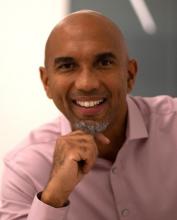May 2023
By Mark Joseph
The Tennessee state legislature expels two young Black state representatives, Justin Jones and Justin Pearson, for protesting in the state chambers to promote gun control. Landlords refuse to rent units to residents being relocated from a public housing development in Cleveland. What is the common root issue here?
Fear.
Fear of the unfamiliar, the unknown, the other. Fear of losing control. Unwillingness to step outside a comfort zone. Unwillingness to open a path to finding some common ground, some shared mutual benefit.
In each case, the perpetrators sacrifice their self-interest due to fear and close-mindedness. Nothing new, I know. Heather McGhee’s brilliant book The Sum of Us: What Racism Costs Everyone and How We Can Prosper Together documents the extent to which White Americans will undermine their own access to resources and opportunities to avoid having to share those resources with people they fear.
The problem is not the fear itself. Fear is a natural reaction to something perceived as unfamiliar and dangerous. The problem is the response to the fear. Our natural action in response to fear is avoidance and exclusion. But we continue to build a polarized and segregated society by giving in to our natural avoidant instincts as soon as we feel fear.
A powerful antidote to fear is curiosity, the first element in our handy dandy racial equity lens (which includes the concepts of curiosity, structure, perception, and belonging).
So, what questions can curiosity yield in the face of fear?
Hmmm, what am I actually afraid of here? What threat does this situation present? What could I learn more about, to see if my fear is justified? What might I be missing here? What would I gain from the actions I am inclined to take in response to this fear? What might I lose out on by acting on my fear? What can I learn from this confrontation with the unknown?
In Tennessee, the Republican legislators feared emboldening these young Black men to think it was ok to act outside the conventions and accepted decorum of the chambers. The legislators were not at all curious about ways their Black colleagues might have been willing to engage and find compromise. Or why the two felt compelled to take that action (along with a single brave White female colleague, who was not expelled). What were the legislators missing in their non-curious haste to punish and exclude? They didn’t realize that by expelling these two men, they were about to turbocharge the Justins’ political careers, social media followings, and campaign funds. And that within two weeks, the expelled legislators would be returned to the chamber in their elected positions by their home municipalities, now much more of a force to reckon with than before. And armed with a glorious new protest chant: “No Justins, no peace!” Ah, so clever.
How about our fearful landlords? What are they afraid of? They fear the residents who are relocating and their families and friends will be nuisance tenants. They’re afraid the bureaucracy of the federal voucher program will not be worth the benefit of the guaranteed full, consistent rent payments. What are the landlords missing with their lack of curiosity? They are unaware that the tenants in the Woodhill-Buckeye Choice Neighborhoods Initiative are part of a much larger public-private sector effort to support their successful relocation, including case managers, family success plans, and an array of employment, educational and health programs for tenants and their children. They also don’t realize that these residents have been receiving months of support before relocating and will be part of a peer network to avoid isolation and provide motivation.
As always, my fellow antiracist journeyers, let’s hold up the mirror on ourselves. How do WE respond to our fears? Are we honest with ourselves and others when we are acting out of fear? Do we acknowledge when our instinct is to feel fear and then activate avoidance?
And how are we doing at building our curiosity muscle? “Help me understand why you . . .?” is a compelling phrasing that we everyday antiracists should be using often.
If you find yourself authentically curious about someone you vehemently disagree with, you’re doing something right, my friends. Keep it up. Your curiosity just might spark theirs. You just might build a small bridge instead of adding to the division. You might learn something that makes you a stronger change agent.
Onwards!
Mark is the Founding Director of The National Initiative on Mixed-Income Communities and the Leona Bevis and Marguerite Haynam Professor of Community Development at the Jack, Joseph and Morton Mandel School of Applied Social Sciences at Case Western Reserve University.


